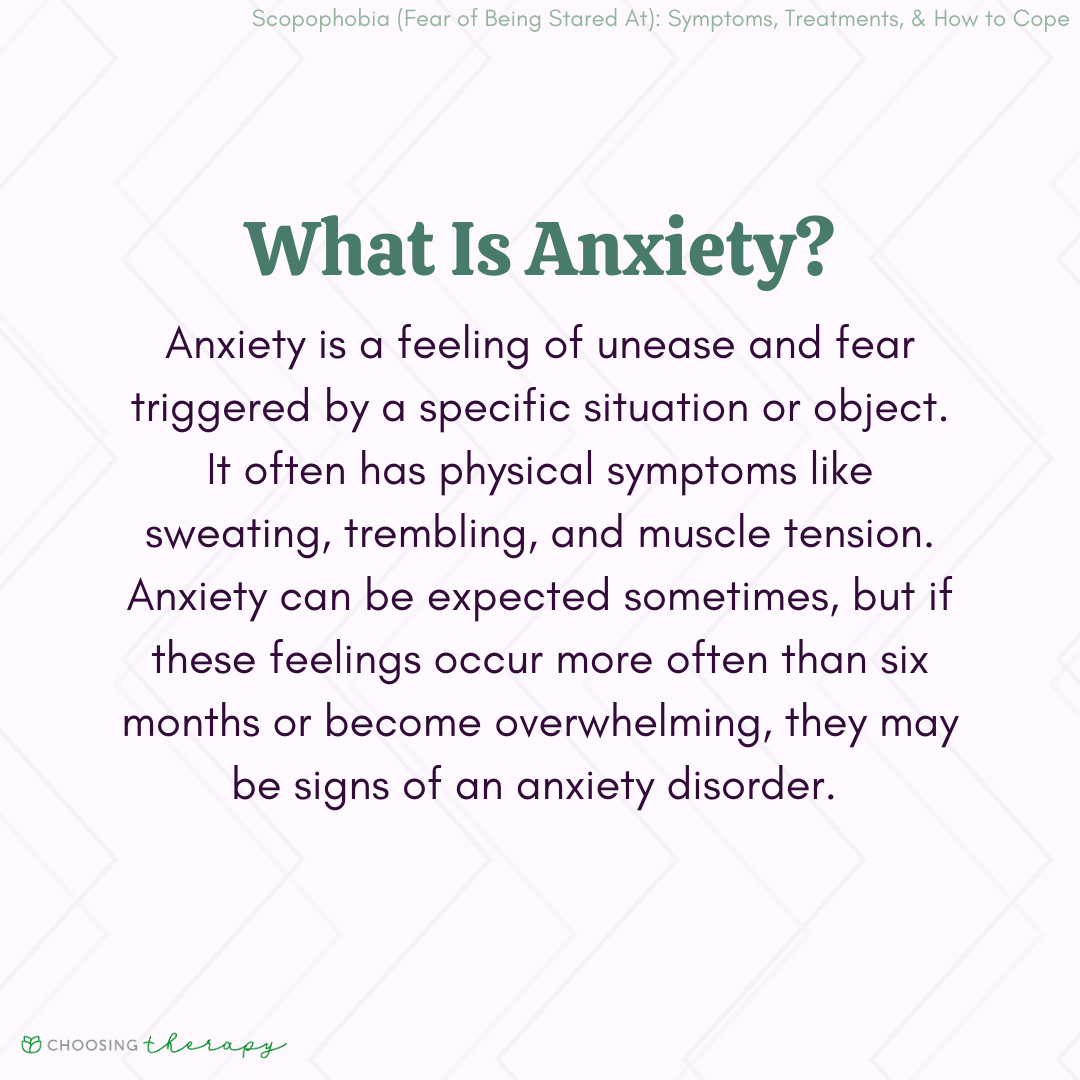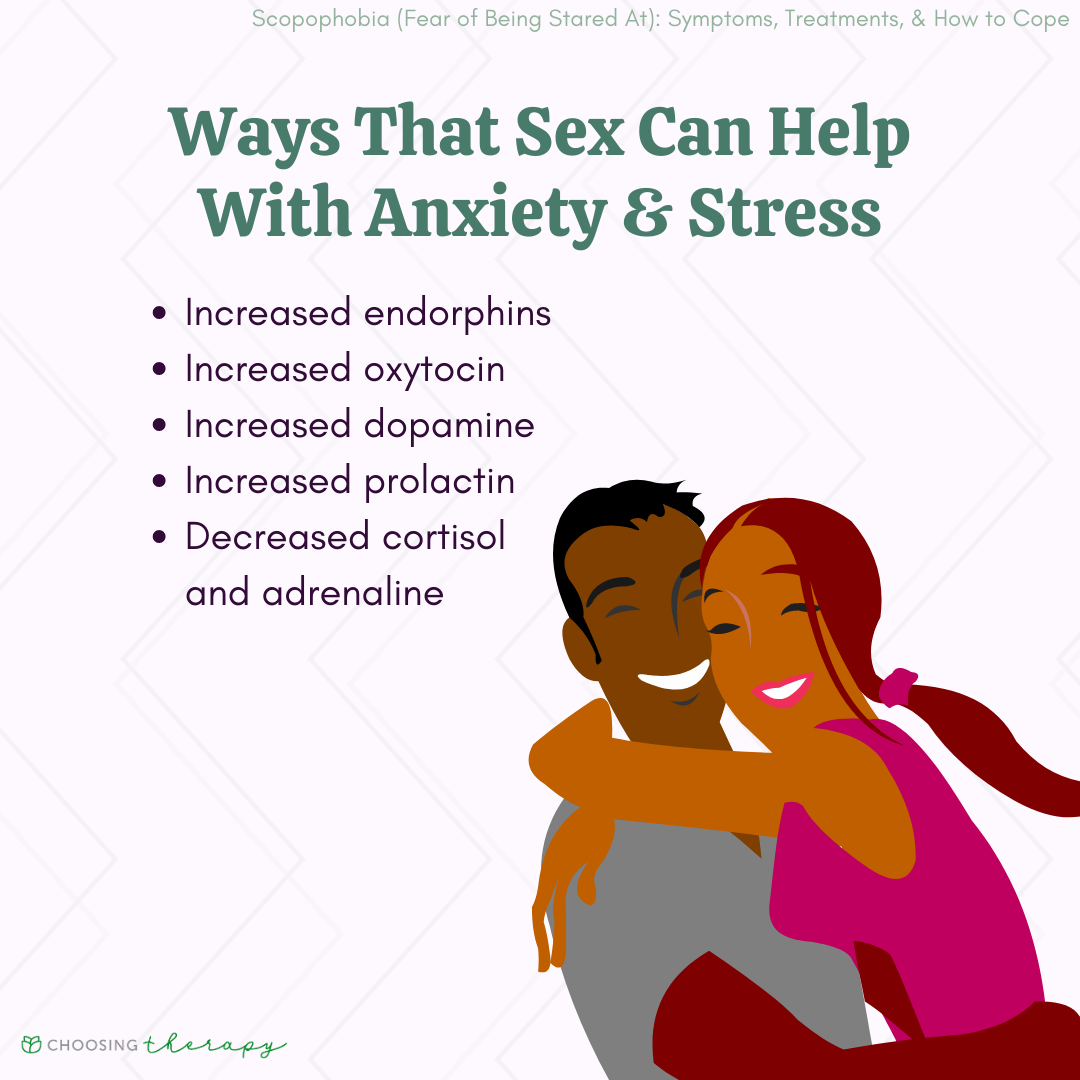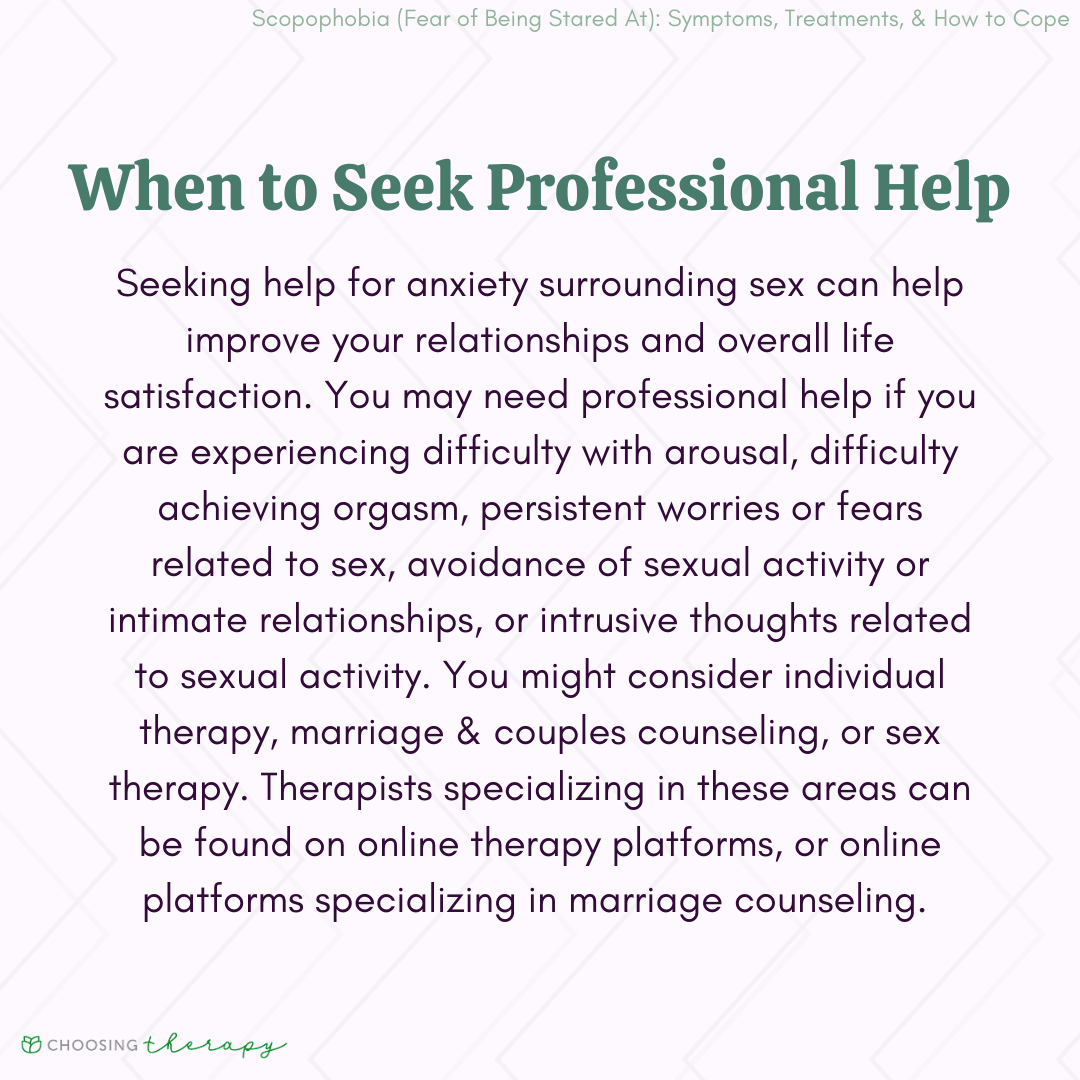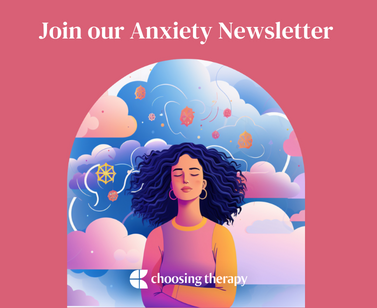Evidence exists that sex can help with anxiety by increasing endorphins and oxytocin in your brain, which have been known to reduce stress levels and increase happiness. However, it is important to note that the impact of sex on anxiety will vary depending on the individual.
Find a supportive therapist who can help with anxiety.
BetterHelp has over 20,000 licensed therapists who provide convenient and affordable online therapy. BetterHelp starts at $65 per week. Take a Free Online Assessment and get matched with the right therapist for you.
What Is Anxiety?
Anxiety is a feeling of unease and fear triggered by a specific situation or object. It often has physical symptoms like sweating, trembling, and muscle tension. Anxiety can be expected sometimes, but if these feelings occur more often than six months or become overwhelming, they may be signs of an anxiety disorder. According to the DSM-V, there are several types of anxiety disorders: generalized anxiety disorder, panic disorder, social anxiety disorder, phobias, and separation anxiety disorder. Anxiety has many symptoms you can recognize if you know what to look for. Some common symptoms of anxiety are physical (sweating, trembling, heart palpitations), mental (excessive worry, racing thoughts, difficulty concentrating), and behavioral (avoidance, restlessness, irritability).
When stressed, your body prepares to respond to a perceived threat. The amygdala–the part of your brain responsible for storing anxiety–triggers the release of norepinephrine and cortisol, hormones that raise your awareness and prepare your body for action. This activates the Autonomic Nervous System, which regulates heart rate, blood pressure, and breathing. These changes make you more sensitive to stressful stimuli and heighten your awareness of stressful events.2
Can a Lack of Sex Cause Anxiety?
While a lack of sex itself does not cause anxiety, it can be a contributing factor to feelings of anxiety, especially if an individual desires sexual activity and is not able to engage in it for an extended period. Common causes for anxiety surrounding sex are generalized sexual anxiety or performance anxiety.
Sexual performance anxiety is a condition that causes fear or anxiety about your ability to perform sexually, which can interfere with your enjoyment of sexual activity.3 This anxiety can manifest itself in several ways, including difficulty achieving an erection, premature ejaculation, difficulty achieving orgasm, or a lack of desire to engage in sexual activity. Sexual anxiety is a type of anxiety that is related to sexual activity.4 It can take many forms, such as worrying about being sexually rejected, feeling uncomfortable or self-conscious during sexual activity, or feeling anxious about the potential consequences of sexual activity (such as unwanted pregnancy or sexually transmitted infections).
How Does Sex Help With Anxiety?
Sexual activity can be a positive coping skill that can help alleviate anxiety, similar to other healthy coping strategies such as exercise or spending time with loved ones. Sexual activity can also be a source of positive emotions, such as pleasure and intimacy, and may even result in crying during sex or after orgasm. These positive experiences and emotions can help create positive associations in the brain, improving mood and well-being. Additionally, sexual activity can help individuals build self-esteem and confidence, positively impacting mental health. Positive emotions stimulate the release of neurotransmitters and hormones in the brain, which regulate mood, reduce stress and anxiety, and promote feelings of pleasure and well-being.
Relaxation techniques like meditation and spending time in nature can also help reduce stress and anxiety levels. The key is to find healthy coping strategies that work for each individual, as what works for one person may not work for another. Additionally, seeking professional support from a healthcare provider or therapist can help individuals struggling with anxiety about sex or their performance during sex.
Below are ways that sex can help with anxiety and stress:
Increased Endorphins
Endorphins are neurotransmitters released during sexual activity, physical activities, and in response to pain. The release of endorphins as a result of physical touch or orgasm is one of the many benefits of orgasming. These chemicals produce a feeling of relaxation and pleasure, and they also help reduce the experience of pain. Due to their relaxing impact, they can also help reduce feelings of anxiety.
Increased Oxytocin
Oxytocin, called the love hormone or cuddle hormone, is released during sexual activity and other times like breastfeeding, birth, and pregnancy. This hormone promotes feelings of bonding and attachment to your partner. It can also help with the reduction of physical pain. Feeling safe and connected to your partner can help reduce overall anxiety levels.
Increased Dopamine
Dopamine is often called the “reward” or “pleasure” hormone because it promotes positive feelings. Dopamine is released in response to pleasurable sensations and can help promote positive feelings associated with an activity. This hormone can improve your mood, motivation, attention, and movement. It can also help relieve depression and anxiety.
Increased Prolactin
Prolactin is a hormone the pituitary gland releases in response to various stimuli, including sexual activity. It plays a part in multiple bodily functions, including lactation, reproductive function, and the immune system. During sexual activity, levels of prolactin may increase, especially in women. However, its effects on sexual function may vary depending on sex, age, and health status.
Prolactin may also play a role in sleep regulation. Research has shown that this hormone may have sedative effects and promote sleepiness. Some studies have linked high prolactin levels with improved sleep quality and reduced symptoms of sleep disorders, such as insomnia.5
Decreased Cortisol & Adrenaline
Sexual activity may also cause a reduction in cortisol and adrenaline levels, particularly when accompanied by orgasm. This may be due to the release of endorphins and other hormones during sexual activity, which can lead to feelings of pleasure and relaxation.
Options For Anxiety Treatment
Talk Therapy – Get help from a licensed therapist. Betterhelp offers online therapy starting at $65 per week. Free Assessment
Psychiatry for Anxiety – Looking for anxiety treatment that prioritizes you? Talkiatry can help. Find an in-network psychiatrist you can see online. Get started with our short assessment. Visit Talkiatry
Other Health Benefits of Sex
In addition to regulating hormones and neurotransmitters, sex can provide other health benefits. It helps reduce stress levels, improve cardiovascular health, and create feelings of intimacy and connection with a partner. However, it is essential to note that everyone may not experience these benefits and that the frequency and nature of sexual intimacy may vary depending on personal preferences or circumstances.
Additional health benefits of sex include:
- Improved brain function. Sexual activity may have cognitive benefits, including better memory and problem-solving abilities. Regular sexual activity may also lower your risk for cognitive decline as you age.
- Improved intimacy with a partner. Sex is an essential component of intimacy between partners. Intimacy involves emotional and physical closeness, trust, and connection between people who care about each other, and sex can be one way of expressing and reinforcing these feelings.
- Burn more calories. Sexual activity can help you burn calories, although the number of calories burned will vary depending on factors such as the intensity and duration of the activity, your body weight and fitness level, and the position and type of sexual activity. While sexual activity alone may not be enough to achieve significant weight loss or physical fitness goals, it can be an enjoyable way to supplement an overall healthy lifestyle.
- Improved mood. Sexual activity is associated with lower stress and anxiety levels, improved mood, and increased well-being. It can also express and reinforce the emotional connections between partners, increasing happiness and contentment.
- Better sleep. Sex can promote feelings of relaxation and lead to the release of hormones such as oxytocin and prolactin, promoting feelings of calmness and contentment. These feelings can promote better quality sleep, as individuals who feel relaxed and calm are often better able to fall asleep and stay asleep throughout the night. Getting enough sleep can also promote healthy sexual function, libido, and energy levels throughout the day.
- Improved cardiovascular health. Regular sexual activity can be associated with a reduced risk of cardiovascular disease and improved blood pressure and cholesterol levels. During sexual activity, the body experiences an increase in heart rate, breathing rate, and blood flow, which can help to strengthen the cardiovascular system and promote overall heart health.
Can Sex Cure Anxiety?
While sexual activity can have potential physical and emotional benefits, it is important to note that it is unlikely to be a cure for anxiety. Anxiety is a complex condition with multiple underlying causes, and anxiety treatment typically involves a multifaceted approach. Medication, therapy, lifestyle changes, and other forms of support may all be involved.
While sexual activity can produce hormones that may ease anxiety, the effects are often temporary, and these hormones do not address the underlying causes of anxiety. Sexual activity may not be feasible or desirable for all individuals depending on their preferences and health status. However, engaging in sexual activity can be beneficial as a temporary relief to ongoing anxiety symptoms for some individuals. As mentioned earlier, sexual activity can provide a sense of relaxation and distraction from negative thoughts and worries that may be contributing to anxiety symptoms.
Can Masturbation Help With Anxiety?
Masturbation can temporarily relieve anxiety symptoms by releasing endorphins and oxytocin, which contribute to feelings of relaxation and well-being. Concerning performance anxiety or a lack of desire, masturbation may remove the anxiety related to the pressure one puts on themselves surrounding sex.
Masturbation is healthy and has benefits, including stress relief, improved mood, sleep, sexual function, and hormonal balance. However, it’s important to remember that masturbation, like sex, is unlikely to cure anxiety and should not replace a comprehensive treatment plan.
When to Seek Professional Help
Seeking help for anxiety surrounding sex can help improve your relationships and overall life satisfaction. You may need professional help if you are experiencing difficulty with arousal, difficulty achieving orgasm, persistent worries or fears related to sex, avoidance of sexual activity or intimate relationships, or intrusive thoughts related to sexual activity. You might consider individual therapy Marriage & Couples Counseling, or sex therapy. Therapists specializing in these areas can be found on online therapy platforms, or online platforms specializing in marriage counseling.
If you are experiencing significant interference with your ability to enjoy life, it is important to seek professional help. This can include work, relationships, day-to-day tasks, sleep, physical symptoms, or social situations. If you are experiencing persistent worry or fear, physical sensations, difficulty sleeping, avoidance of social situations or intrusive thoughts, then anxiety treatment can improve your life.
Final Thoughts
Sexual anxiety can affect your ability to enjoy sexual activity and can negatively impact your mental or emotional health. Seeking help for sexual anxiety is important for improving your sexual functioning and addressing underlying issues, such as depression or anxiety, which can negatively impact your quality of life. Remember, seeking help for sexual anxiety is a sign of strength and it can help you address underlying mental health issues while also improving your overall well-being and quality of life.
Additional Resources
To help our readers take the next step in their mental health journey, Choosing Therapy has partnered with leaders in mental health and wellness. Choosing Therapy is compensated for marketing by the companies included below.
Talk Therapy
Online-Therapy.com – Get support and guidance from a licensed therapist. Online-Therapy.com provides 45 minutes weekly video sessions and unlimited text messaging with your therapist for only $64/week. Get Started
Virtual Psychiatry
Hims / Hers If you’re living with anxiety or depression, finding the right medication match may make all the difference. Connect with a licensed healthcare provider in just 12 – 48 hours. Explore FDA-approved treatment options and get free shipping, if prescribed. No insurance required. Get Started
Anxiety Newsletter
A free newsletter from Choosing Therapy for those impacted by anxiety. Get helpful tips and the latest information. Sign Up
Learn Mindfulness, Meditation, & Relaxation Techniques
Mindfulness.com – Change your life by practicing mindfulness. In a few minutes a day, you can start developing mindfulness and meditation skills. Free Trial
Choosing Therapy Directory
You can search for therapists by specialty, experience, insurance, or price, and location. Find a therapist today.
Best Online Therapy Services There are a number of factors to consider when trying to determine which online therapy platform is going to be the best fit for you. It’s important to be mindful of what each platform costs, the services they provide you with, their providers’ training and level of expertise, and several other important criteria.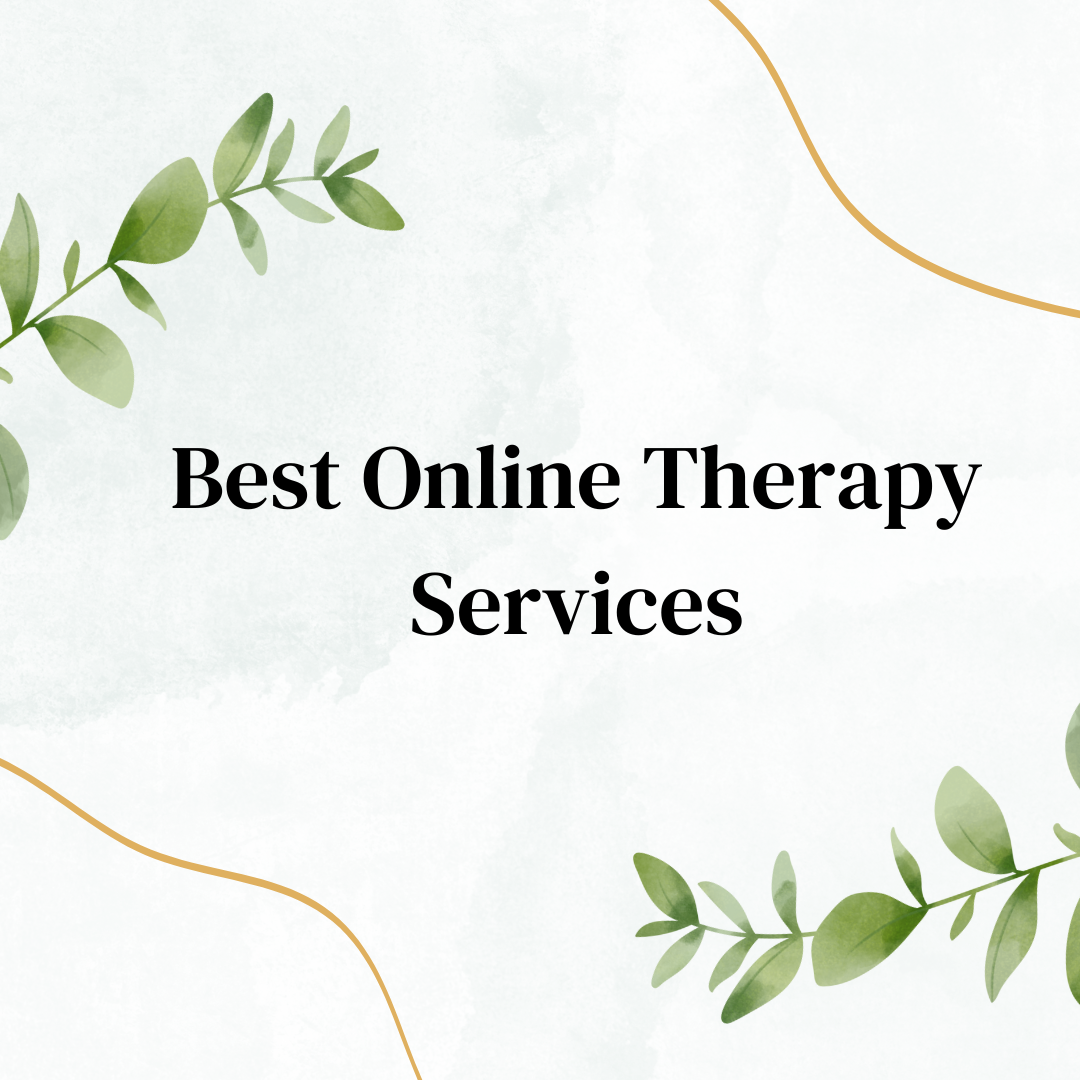
Best Online Psychiatry Services Online psychiatry, sometimes called telepsychiatry, platforms offer medication management by phone, video, or secure messaging for a variety of mental health conditions. In some cases, online psychiatry may be more affordable than seeing an in-person provider. Mental health treatment has expanded to include many online psychiatry and therapy services. With so many choices, it can feel overwhelming to find the one that is right for you.



